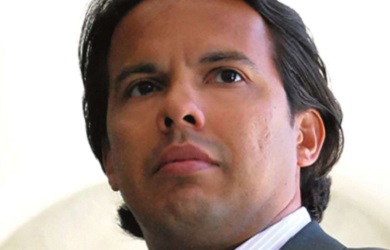At Wednesday night’s presidential debate, former Florida Gov. Jeb Bush went out of his way to tout “a voucher program that was created under my watch, the largest voucher program in the country, where kids can go to a Christian school” — a phrase he sandwiched into a conversation about Donald Trump criticizing him for speaking Spanish in public.
Julie Ingersoll, a religious studies professor at the University of North Florida, tweeted a reminder that her book on Christian Reconstructionism, which was recently released by Oxford University Press, mentions Bush’s voucher program. “Building God’s Kingdom: Inside the World of Christian Reconstructionism” includes chapters on the enormous influence of Christian Reconstructionism in the homeschooling and Christian school movements, which have succeeded in getting states like Florida to funnel taxpayer money to their religious education efforts
Christian Reconstructionism, grounded in the teachings of 20th-century writer R.J. Rushdoony, has greatly influenced both the Religious Right and Tea Party movements with its doctrine of “sphere sovereignty,” which states that God has given government, church, and family specific responsibilities over different “spheres.” Reconstructionists argue that there is no biblical authority for the government to take on a duty that is given to church or family – for example, they argue that the government has no role in caring for the poor because charity is the job of the church.
Reconstructionism teaches that education is the duty of parents, and that the state therefore has no role in or legitimate authority over the education of children. Reconstructionists led legal and political battles to win the right of parents to homeschool their children, and continue to resist efforts at regulating homeschoolers. As Ingersoll notes, “Reconstructionists are unabashedly committed to the dismantling of public education, and their strategies and solutions have gained a hearing far beyond the boundaries of the small groups explicitly affiliated with them.” In June, Texas Gov. Greg Abbott named a right-wing homeschooler to chair the state’s Board of Education.
The organized and intensely active network of evangelical homeschooling families in Iowa is credited, in part, with Mike Huckabee’s win in the 2008 Iowa caucus, and the Associated Press reported this year that presidential candidates have been jockeying for its leaders’ support.
Ingersoll also explores how central creationism is to the Christian Reconstructionist worldview; as others have noted, creationism also forms the basis of “science” education in books and curricula used by some Christian schools and homeschoolers.
Ingersoll writes about the independent, Reconstructionism-inspired Rocky Bayou Christian School in Niceville, Florida, which was founded in the 1970s. In addition to the hundreds of students in its K-12 program, the school offers a program allowing homeschoolers to participate in courses and activities. Writes Ingersoll, “RCBS also has a program designed to take advantage of Florida’s school voucher plan. The plan, put into place by former Governor Jeb Bush, permits students at ‘failing public schools’ to obtain vouchers that can be used at any school.”
According to Ingersoll, the Bush voucher program “has become such a significant revenue stream” for Rocky Bayou Christian School that “it would have a major impact on the school if the state were to decide to discontinue the controversial program….” But, she notes, “the conservative legislature took up the effort to expand the state’s privatization of public education with vouchers and the expansion of charter schools.”
Indeed, legislation signed by Gov. Rick Scott last year expanded voucher and tax-credit programs; it also, according to the Orlando Sentinel, created state-funded “personal learning scholarship accounts” that “parents of students with certain disabilities can use to pay for private school, buy home-school curriculum or pay for needed therapies, among other services, if their child is not in public school.”
Florida is not the only state where proponents of privatization have won victories. Louisiana’s Bobby Jindal used the Katrina disaster to push through a radical privatization scheme and has battled the Obama administration over its efforts to monitor the state’s voucher program’s effect on racial segregation. Proponents of “school choice” had a major victory in Nevada this year, where a law pushed by an education foundation created by Jeb Bush would allow parents of any income level to “pull a child from the state’s public schools and take tax dollars with them, giving families the option to use public money to pay for private or parochial school or even for home schooling.” While some Christian homeschoolers want no part of voucher programs, because they believe taking voucher money would bring more intrusive government regulation, laws like Nevada’s could prove a windfall for Religious Right and Christian Reconstructionist groups that provide curricula to homeschoolers.
Ingersoll writes about a 2009 Men’s Leadership Summit hosted by the Christian Home Educators of Colorado at an Indianapolis facility of Bill Gothard’s Institute for Biblical Life Principles, a troubling organization in the news recently for its connection to the Duggar family. The purpose of the summit, writes Ingersoll, was the development of a “Christian Education Manifesto,” which is no longer public, but whose goals included the elimination of public education and dismantling of government agencies that regulate the rights of parents, such as child welfare and child protective service groups.
There have been some setbacks for the privatization movement. In June, the Colorado Supreme Court ruled that its state’s Choice Scholarship Pilot Program violates the state Constitution by channeling public money to private religious schools, contrary to an explicit constitutional prohibition on doing so.
But, as Ingersoll notes, the massively funded privatization movement is advancing the dream of the Christian Reconstructionists:
Florida’s efforts mirror attempts across the nation to shift the delivery of public education to the private sector; a shift of tax money from a public endeavor intended to educate and foster a shared sense of what it means to be American to sectarian efforts, including efforts at schools like Rocky Bayou which seek to transform society according to biblical law. The long-standing goal of the Christian Reconstructionists to defund, and ultimately eliminate, public education has come as close as it has ever come to being a reality.








